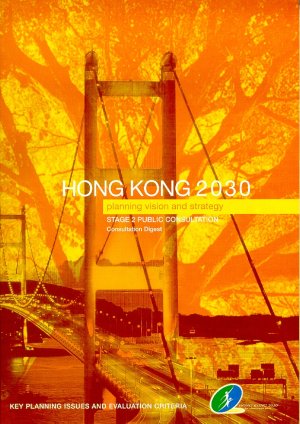
https://www.pland.gov.hk/file/planning_studies/comp_s/hk2030plus/index.htm
In the wake of the previously completed Territorial Development Strategy, the highest tier of land use planning for Hong Kong and the last review of the Territorial Development Strategy, completed in late 1996. The Hong Kong SAR Government launched a study in November 2000 entitled "HK2030: Planning Vision and Strategy" ('the HK2030 Study'), to review the Territorial Development Strategy and bring it up-to-date. Under the overarching goal of adhering to the principle of sustainable development, one of the planning objectives of the HK2030 Study is to provide a good quality living environment.
To achieve this, it is necessary to establish the required environmental targets during the initial stage of the Hong Kong 2030 Study. In view of the environmental problems identified in the last TDSR, it is also necessary to spend more efforts under the Hong Kong 2030 Study on assessing our environmental capital, or budget for use as a basis, among other factors, for deriving development options. Besides setting the targets, as there is increasing demand for environmental resources and their supply is not unlimited, it is also necessary to work out the environmental carrying capacity and the demand that would be generated from the future developments. Apart from the developments in Hong Kong, regional development in Pearl River Delta may also influence Hong Kong's environmental conditions. To address all these issues, an on-going SEA has been/will be carried out to form an integral part of the Hong Kong 2030 Study.
Unlike the conventional approach, some esteemed external members (including the Green Groups, academics, and professionals) have been invited to join the Environmental Study Management Group to form a panel of external specialist advisors for the SEA Study. The HK2030 Study has also adopted a proactive approach to consult and involve the public. In order to foster community consensus on the key issues and promote ownership of the outcome, the public as well as all stakeholder groups have been/will be closely consulted throughout the entire study process. In particular, they have been/will be consulted at each of the following four key stages of the HK2030 Study:
- Stage 1 : Agenda Setting, Baseline Review and Identification of Key Issues;
- Stage 2 : Examination of Key Issues;
- Stage 3 : Formulation and Evaluation of Scenarios and Options; and
- Stage 4 : Formulation of Development Strategies and Response Plans.
In addition to the above proactive public consultation process, several brainstorming sessions, view sharing workshops, and other focus meetings have been/will be held with the external specialist advisors and the public with a view to collect their views and suggestions on environmental-friendly ideas, options and measures and other environmental initiatives for the SEA study to take on board.
|
| [ << BACK PAGE ] [ 23 / 37 ] [ NEXT PAGE >> ] |
 Strategic Environmental Assessment (SEA) Knowledge Centre
Strategic Environmental Assessment (SEA) Knowledge Centre 

